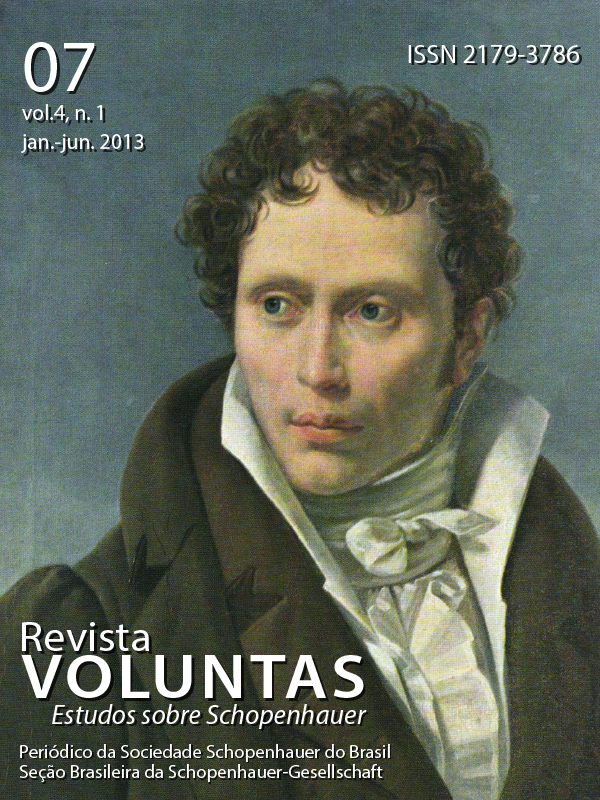Schopenhauer, Nietzsche, the eternity of life of the Will and the unscathed creative force of the Dionysian spirit
DOI:
https://doi.org/10.5902/2179378633985Keywords:
Will, Eternity, DionysianAbstract
In this article we have a philosophical convergence between Schopenhauer and Nietzsche about the ontological question of eternity of natural life, notwithstanding the finitude of individuality governed by the categories of space and time. We demonstrate that Schopenhauer, nevertheless receive the nickname of pessimistic, presents a worldview that allows overcoming the grief of existence upon the hypothesis that only the individual life disappears in the event of death, and not the conditions of possibility of life, the desire. Nietzsche, in turn, argues that life, despite its finitude, is worthy of being lived in its fullness, as it is only the individual configuration dissipates by the event of the death, never the Dionysian power that is present in every individual shapes.
Downloads
References
ANAXIMANDRO. “Fragmentos” In: In: Vol. Pré-Socráticos, Col. “Os Pensadores”. Trad. de José Cavalcante de Souza. São Paulo: Nova Cultural, 2000.
BACHOFEN. J. J. El Matriarcado – una investigación sobre la ginecocracia en el mundo antiguo según sua naturaleza religiosa y jurídica. Trad. Esp. de Maria del Mar Llinares Garcia. Madrid: Akal, 2007.
BRANDÃO, Junito de Souza. Mitologia Grega, Vol. II. Petrópolis: Vozes, 1987.
DELEUZE, Gilles. Nietzsche e a Filosofia. Trad. de António M. Magalhães. Porto: Rés-Editora, 2001.
ÉSQUILO. Oréstia [Agamêmnon, Coéforas, Eumênides] Trad. de Mário da Gama Kury. Rio de Janeiro: Jorge Zahar, 2003.
HERÁCLITO. “Fragmentos”. In: Vol. Pré-Socráticos, Col. “Os Pensadores”. Trad. de José Cavalcante de Souza. São Paulo: Nova Cultural, 2000.
HOMERO. Ilíada. Trad. de Carlos Alberto Nunes. Rio de Janeiro: Ediouro, 2002.
JAEGER. Werner. Paidéia: a formação do homem grego. Trad. de Artur M. Parreira. São Paulo: Martins Fontes, 1995.
LESSING, G. E. Emilia Galotti / Minna von Barnheim ou a felicidade do soldado.Trad. de Marcelo Backes. Porto Alegre: Mercado Aberto, 1999.
KERENYI, Karl. Dioniso: imagem arquetípica da vida indestrutível. Trad. de Ordep Serra. São Paulo: Odysseus, 2002.
MAFFESOLI, Michel. O Instante eterno: o retorno do trágico na sociedade pós-moderna. Trad. de Rogério de Almeida e Alexandre Dias. São Paulo: Zouk, 2004.
MAFFESOLI, Michel. A sombra de Dioniso – contribuição a uma sociologia da orgia. Trad. de Rogério de Almeida. São Paulo: Zouk, 2005.
NIETZSCHE, Friedrich. Cinco Prefácios para cinco livros não escritos. Trad. de Pedro Süssekind. Rio de Janeiro: Sette Letras, 1996.
NIETZSCHE, Friedrich. Crepúsculo dos Ídolos ou como se filosofa com o martelo. Trad. de Paulo César de Souza. Companhia das Letras: São Paulo: 2006.
NIETZSCHE, Friedrich. Ecce Homo – como alguém se torna o que se é. Trad. de Paulo César de Souza. São Paulo: Companhia das Letras, 2001.
NIETZSCHE, Friedrich. A Filosofia na Idade Trágica dos Gregos. Trad. de Maria Inês Madeira Andrade. Lisboa: Ed. 70, 2002.
NIETZSCHE, Friedrich. O nascimento da Tragédia ou helenismo e pessimismo. Trad. de J. Guinsburg. São Paulo: Companhia das Letras, 1996.
NIETZSCHE, Friedrich. A visão dionisíaca de mundo e outros textos [Sócrates e a Tragédia e O Drama Musical Grego]. Trad. de Marcos Sinésio Pereira Fernandes e Maria Cristina dos Santos de Souza. Martins Fontes: São Paulo: 2005.
OTTO, Walter Friedrich. Teofania: o espírito da religião dos gregos antigos. Trad. de Ordep Serra. São Paulo: Odysseus, 2006.
SCHOPENHAUER, Arthur. Metafísica do Amor/Metafísica da Morte. Trad. de Jair Barboza. São Paulo: Martins Fontes, 2000.
SCHOPENHAUER, Arthur. O Mundo como Vontade e como Representação. Trad. de Jair Barboza. São Paulo: Ed. UNESP, 2005.
SZONDI, Peter. Ensaio sobre o Trágico. Trad. de Pedro Süssekind. Rio de Janeiro: Jorge Zahar, 2004.
VERNANT, Jean-Pierre & VIDAL-NAQUET, Pierre. Mito e Tragédia na Grécia Antiga. Trad. de Anna Lia A. de Almeida Prado, Filomena Yoshie, Hirata Garcia, Maria M. Cavancante, Bertha H. Gurovitz e Hélio Gurovitz. São Paulo: Perspectiva, 1999.
Downloads
Published
How to Cite
Issue
Section
License
The submission of original manuscripts to this journal implies the transference, by the authors, of the copyrights for printed and digital publication. The copyrights of a published manuscript belong ultimately to the author, and only the copyright for its first publication is reserved to the journal. Authors may only use the same results in other publications explicitly indicating this journal as the medium of the original publication.
Licence
Attribution-NonCommercial-ShareAlike 4.0 International (CC BY-NC-SA 4.0) - This license lets others remix, tweak, and build upon your work non-commercially, as long as they credit you and license their new creations under the identical terms.







